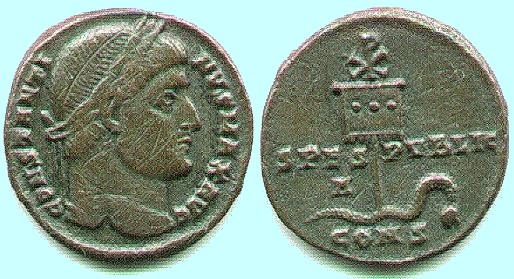
 |
Freethought & Rationalism ArchiveThe archives are read only. |
|
|
#21 | |||
|
Contributor
Join Date: Feb 2006
Location: the fringe of the caribbean
Posts: 18,988
|
Quote:
When Jerome mentioned Tertullian he claimed that Tertullian wrote several books AGAINST the Church and listed his works. Jerome's De Viris Illustribus Quote:
Quote:
Effectively, writings attributed to Tertullian are extremely questionable and were unknown for hundreds of years. |
|||
|
|
|
|
#22 |
|
Veteran Member
Join Date: Nov 2011
Location: USA
Posts: 4,095
|
I think a better express of this would be that "Official Church history states that Constantine legalized Christianity and that Theodosius I made it the official religion 50 years later" (although who knows what Christianity or "official religion" actually meant since for years the believers were arguing over points of doctrine).
But since the Church is not an independent source of information, the question arises as to WHAT exactly Constantine did, IF he did it (unless the attributions to him were later backdated to enhance the claim of a prior existence of the official Christian religion indicated per the very first Nicaean creed of the Chi Rho religion). |
|
|
|
|
#23 | ||||||
|
Contributor
Join Date: Mar 2006
Location: Falls Creek, Oz.
Posts: 11,192
|
Quote:
Quote:
Quote:
Quote:
The other problem with the Tertullian priority is that it is Latin and from Carthage when the real discussions and formulation of the trinity were in Greek from the Eastern Empire, and only appear in the record after Nicaea. The Greek conceptual framework of the Christian trinity evolved from the Platonic trinity as expressed by Plotinus in the "Enneads". This did not happen until well after the Nicaean "boundary event". |
||||||
|
|
|
|
#24 | |
|
Contributor
Join Date: Mar 2006
Location: Falls Creek, Oz.
Posts: 11,192
|
Quote:
Constantine and the CHI RHO  Constantine may have established the centralised monotheistic state CHRESTIAN religion since the name of god and lord and jesus and (chrest or Christ) were all hidden in coded forms. |
|
|
|
|
|
#25 | |||||
|
Veteran Member
Join Date: Apr 2002
Location: N/A
Posts: 4,370
|
Quote:
Quote:
Quote:
Quote:
All the best, Roger Pearse |
|||||
|
|
|
|
#26 | |||
|
Contributor
Join Date: Feb 2006
Location: the fringe of the caribbean
Posts: 18,988
|
Quote:
Quote:
We have "Against Heresies", "Refutation Against All Heresies", "The Prescription Against Heresies", "Against Marcion", Dialogue with Trypho, "De Principiis" and many more which exposed Multiple teachings of numerous cults of Christians. Origen completely destroys any claim of orthodoxy or universal creed in the Jesus cult up to at least the 3rd century. The Preface to De Principiis Quote:
|
|||
|
|
|
|
#27 | |
|
Veteran Member
Join Date: Sep 2003
Location: On the path of knowledge
Posts: 8,889
|
Quote:
But then the Orthodox victors were careful that no actual writings of those that held different views, or wrote things opposed and embarrassing to them would survive. 'The NT tells us that (a) there is only one God, the Father (b) that Jesus is God (worshipped, prayed to) and (c) that Jesus is not the Father.' The writings of the Church Fathers make it clear that many Christian 'heretics' did not accept much of the content or claims of these "NT" documents. These Christians believed in and taught of another God and another Son, not the 'recieved' "NT" doctrine or writings of the orthodox. The very writings of the orthodox Church Fathers testify against themselves. |
|
|
|
|
|
#28 | |
|
Veteran Member
Join Date: Feb 2001
Location: Birmingham, Alabama
Posts: 4,109
|
Quote:
Bishopric and enrich yourself. You could still marry at this point. These synods were not the debating society you think they were. They were highly political. SLD |
|
|
|
|
|
#29 | |||
|
Contributor
Join Date: Mar 2006
Location: Falls Creek, Oz.
Posts: 11,192
|
Quote:
It is to be expected that a newly supreme warlord would want to call a meeting of all the key, high-level people in his newly acquired empire in order to set in place the "new arrangements" and "new contracts" that would soon be set in place under the "new administration" ..... Council of war Quote:
Quote:
|
|||
|
|
|
|
#30 | ||
|
Veteran Member
Join Date: Apr 2002
Location: N/A
Posts: 4,370
|
Quote:
All the best, Roger Pearse |
||
|
|
| Thread Tools | Search this Thread |
|